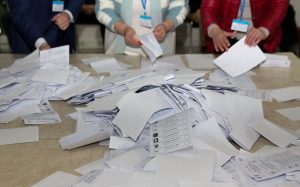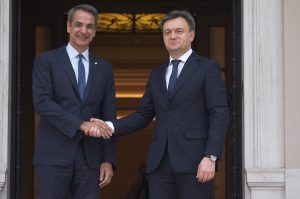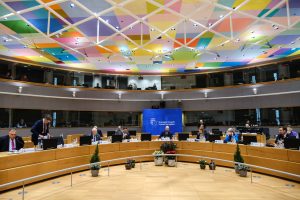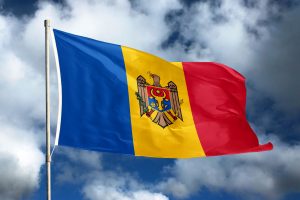CHISINAU, Moldova—At a padlocked storeroom here in the Moldovan capital, under close police guard, there sits a mound of pro-Russian propaganda that authorities say was part of an unprecedented Moscow-led attempt to sway a historic vote on the country’s future.
Officials say the illegal campaign material, amounting to a million leaflets and newspapers, was churned out to derail Sunday’s presidential election and a referendum on constitutional changes meant to bring the former Soviet republic closer to joining the European Union.
The seized material should have been clearly marked as campaign related to align with the country’s election laws. But an unknown amount is still circulating as part of what police say was part of a massive, Russian-backed effort to skew the vote led by a Moldovan oligarch convicted of his role in a $1 billion bank heist.
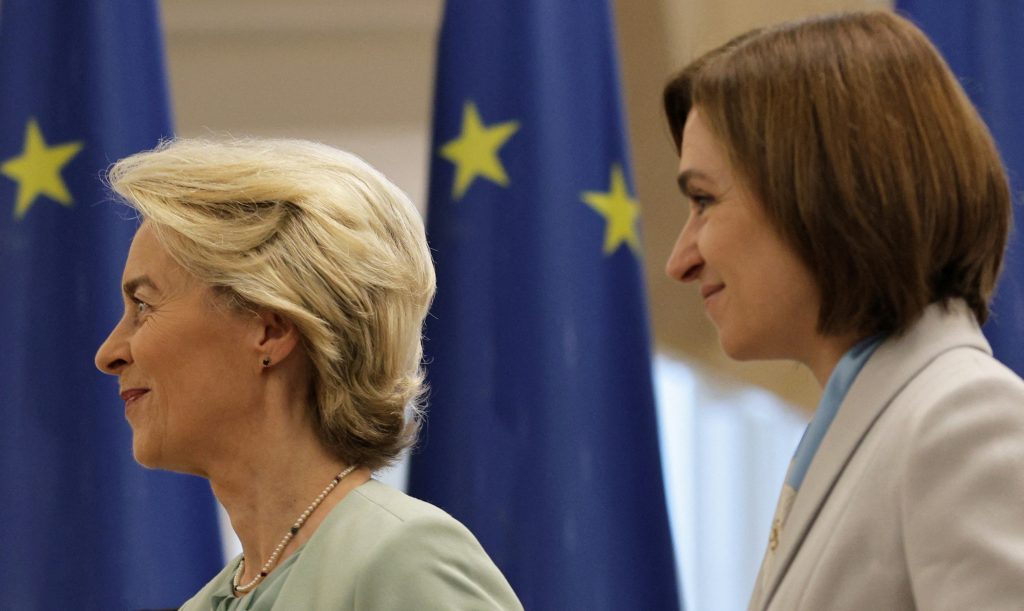
Moldovan President Maia Sandu and European Commission president Ursula von der Leyen attend a joint press conference in Chisinau, Moldova October 10, 2024. REUTERS/Vladislav Culiomza
“What they’ve been trying to do on a large-scale nationwide feeds off similar tactics they tried during previous elections,” said Moldova’s police chief Viorel Cernauteanu , as he swiped through slides on a tablet showing a web of money and connections he says lead from Moscow to Moldova.
Moldovan law enforcement services say the campaign was spearheaded by Ilan Shor , a fugitive Moldovan businessman and politician who now lives in Moscow and openly campaigns to reject closer ties to the EU.
Hundreds of Shor operatives brought suitcases of cash from Moscow, they said, inundated Moldovan smartphones with anti-EU audio messages, and helped transfer funds to some 130,000 residents in exchange for their pledge to vote against making joining the bloc part of the country’s constitution.
The tactic might have swayed the outcome. Polls early on Monday morning suggested a razor-thin majority against the pro-EU constitutional changes, and indicated that pro-Western President Maia Sandu will have to contest the vote in a second round early next month.
In a speech as late results came in, she said the country had faced an “unprecedented assault.”
“Criminal groups, working together with foreign forces hostile to our national interests, have attacked our country with tens of millions of euros, lies, and propaganda,” Sandu said, without naming Russia.
With key parliamentary elections scheduled for next year, and ample evidence that Shor’s multifaceted campaign has fueled anti-EU sentiment in this poor country on Europe’s edge, officials in Chisinau say the $100 million spent by Moscow on this vote was just a taste of what is to come.
“The real threat will come next year,” Cernauteanu said.
Russia’s war in Ukraine has strained the economies of former Soviet states that were once staunch allies of Russia, forcing many countries that once deftly played Moscow off the West to choose sides.
Moscow has seen much of its influence in the region erode. Armenia has said it would pull out of a Russia-led regional military bloc after Moscow failed to back it in a recent war with Azerbaijan. The Baltic states have restricted entry for Russian citizens in a bid to limit Moscow’s influence.
Yet Russia appears to be gaining a geopolitical edge elsewhere.
The Caucasus nation of Georgia, which is preparing for a parliamentary election next week, has violently cracked down on protests against Russian-style legislation passed by its pro-Moscow government. Belarus, which saw a wave of opposition protests nearly topple its president in 2020, is now a client state of Moscow.
In Moldova, landlocked between Romania and Ukraine, those strains have come to the fore over the course of the referendum campaign.
Sandu was first elected in 2019 on a promise of steering closer to Europe as Moldovans, frustrated by corruption and worsening poverty, looked for a new direction. The Harvard graduate has positioned Moldova firmly on Ukraine’s side in the war with Russia, whose missiles have sometimes passed through Moldovan airspace.
The EU granted Moldova official candidate status, and last week pledged the equivalent of $1.96 billion in economic support, a huge sum for a poor country of 2.5 million people.
But the country has been hit hard by the war . Russia slashed deliveries of natural gas that used to flow via Transnistria, a breakaway Russian-backed state in Moldova that hosts a military base with 1,500 troops loyal to Moscow. Fuel prices surged, driving inflation higher. Pro-Russian parties seized on a massive influx of Ukrainian refugees to raise turnout at antigovernment rallies and sharpen internal divides.
“Moldova was by far the most affected country by Russian aggression, besides Ukraine itself,” said Moldova’s Foreign Minister Mihai Popsoi .
The referendum is Sandu’s effort to cement support for the EU; polls show that the majority of Moldovans support membership. But some of her challengers have described it as a ploy to boost her popularity, and even some supporters have warned the risky vote could backfire if it fails to pass.
Sandu’s government has blocked a network of pro-Russian television channels in Moldova, and barred a number of Moscow-backed politicians from contesting elections, saying they had violated election laws or illegally received funds from abroad.
That left Shor to lead the charge for Russia, from his new base in Moscow.
Now 37 years old, he left Moldova after being convicted in absentia in 2017 for his role in a heist that resulted in $1 billion being taken out of the country from Moldovan banks, equivalent to some 12% of the country’s gross national product. He has since been sanctioned by the EU and the U.S. for his alleged role in destabilizing the country’s politics, and has become a prominent fixture on Moscow’s political scene.
For Cernauteanu, the police chief, the clearest sign that Shor was planning to influence Sunday’s vote came in August, when Moldovan delegates returned from a political conference hosted by Shor in the Russian capital. Police seized some $1 million cash carried in more than 100 suitcases the delegates brought back. Many of the travelers had freshly minted Moldovan passports, and had never been abroad.
The following month, Shor proxies in Russia transferred around $15 million to Moldovan citizens via accounts in a Russian state bank sanctioned in Moldova and the West, which the citizens could only withdraw with help from relatives in Transnistria or in Russia. The funds came in exchange for a commitment to vote “no” in the EU referendum, Cernauteanu said.
Moldova has blocked some 200 Telegram channels it says are tied to Shor, and arrested pro-Russian politicians on corruption and related charges.
Shor has denounced the arrests as part of a political crackdown. On Friday, Cernauteanu says Shor’s followers began sending audio messages to tens of thousands of Moldovan phone numbers, encouraging the recipients to vote against the EU.
“We thought we had seen it all,” said Olga Rosca, a foreign-policy adviser to Sandu. “But this has been an unprecedented attempt to hijack our democratic process.“
Shor has denied paying for votes. He didn’t respond to a request for comment. Responding to the allegations leveled by Cernauteanu’s team, he wrote on social media: “You count like preschoolers, and it’s even offensive: our scale is much larger.”
From exile, he has been pumping out his pro-Russian and anti-EU message, promising free gas and electricity if Moldovans partner with Russia and threatening Sandu and other government officials with prison if the political grouping he backs ever comes to power.
“The dictatorship of the pro-Western puppet regime, wars, gay parades—all of this will come to our land with the European Union, and all of this has been brought already by Sandu,” he posted last week.
Moscow has denied any attempts to interfere with Moldova’s election, but it has repeatedly described Sandu’s government as a client state of the West. Russian Foreign Minister Sergei Lavrov warned last year that Moldova could become “the next Ukraine” because of its aspiration to join the North Atlantic Treaty Organization.
“Russia’s goal is to keep Moldova as a weak country with weak institutions, weak defenses, and a population that will not entirely oppose Russian domination here,” said Valeriu Pasa, who runs a think tank allied with the government. “They’re now fighting to keep their instruments of influence.”
The chances of significant unrest in Moldova remain small, at least for now.
Russia’s military resources are tied down in its costly war in Ukraine, and Sandu’s government has successfully marginalized Shor’s network of pro-Russian politicians. A Shor ally who serves as leader of Gagauzia, a region in east Moldova, is under investigation for helping funnel illicit Russian money to the country.
But officials in Chisinau say the real risk will come during parliamentary elections next year, when the pro-Western government assembled by Sandu will be severely tested. They warn that the narrative peddled by Shor and other Moldovan politicians backed by Russia resonates with many residents of a country where the average monthly wage is around $750.
A case study of Shor’s outsize influence is Orhei, a town of 20,000 residents where he served as mayor for four years. Shor spent lavishly on infrastructure in the town 30 miles north of Chisinau, building new roads, scrapping transport fees, and opening a chain of discount stores named after himself.
On the outskirts, he opened a free amusement park with advertisements for his TV channels and the foundation he runs from Moscow. In a country where many older residents have nostalgia for the Soviet Union, such initiatives tap in to a belief that the government should fulfill people’s every need.
“People are used to a paternalistic state,” said Eugenia Mustea, a 33-year-old doctor who on Sunday was visiting her native Orhei from France, where she lives with her French husband, Charles, and 2-year-old daughter, Erika.
Mustea, a member of Moldova’s million-strong diaspora abroad, voted in favor of the EU, but warned: “It’ll take time, and many generations, to change people’s mindset and way of thinking.”
She no longer discusses politics with her parents, who are Russian speakers who look to Moscow.
For now, parts of Moldova remain susceptible to Shor’s influence.
Rumors abound in Orhei of locals being paid off by Shor, who remains popular in the town despite his conviction for large-scale theft. Zinaida Muravska, a former accountant who now relies on a pension of $150 that she says barely covers her food and medication needs, rejected the pro-EU changes on the ballot she cast on Sunday.
The pro-Russian material seized by Moldovan police appeared in Orhei months ago. One is a newspaper with Soviet-style red lettering and images of Shor throughout. Another carries a stark warning in Russian and Romanian, Moldova’s official language, about a massive auction of Moldovan land to foreigners if the country votes for the EU.
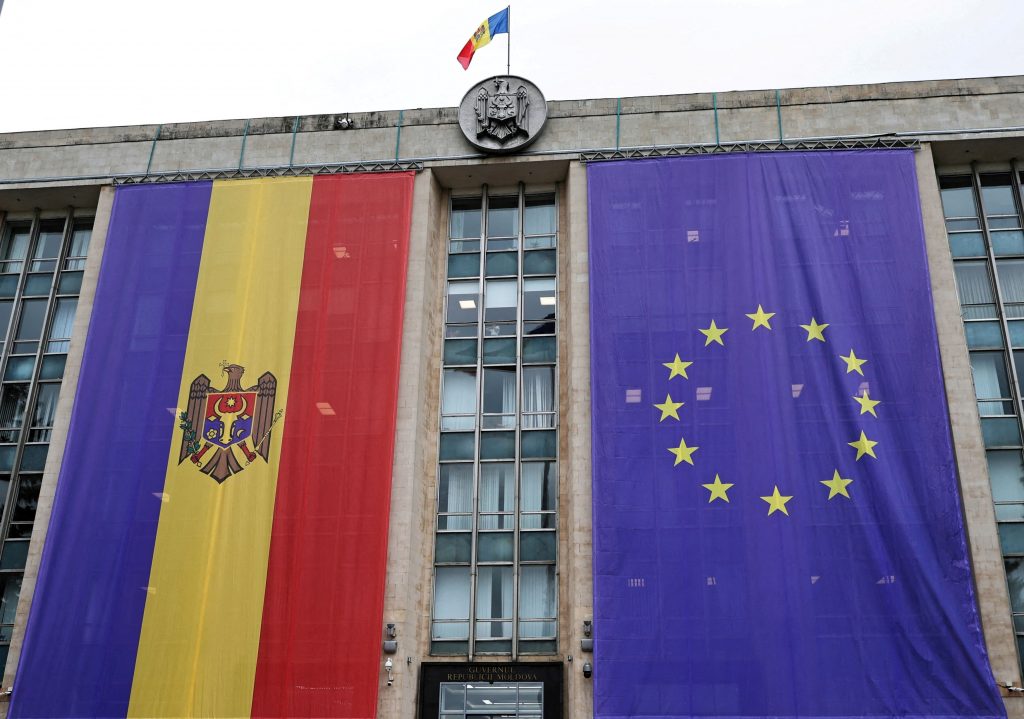
FILE PHOTO: Flags of Moldova and the European Union are displayed on the Government House during an official welcoming ceremony for Polish Prime Minister Donald Tusk in Chisinau, Moldova September 4, 2024. REUTERS/Vladislav Culiomza/File Photo
Muravska says she has written letters to Shor asking him to make changes in the town. She said she qualifies for an extra pension payment he promised ahead of the referendum to those who oppose EU membership, but it never arrived in her account for reasons she can’t explain.
“If we weren’t this poor,” she said as she picked through fruit at a market in the town, “then we wouldn’t be so easily bought.”
Write to Matthew Luxmoore at matthew.luxmoore@wsj.com
